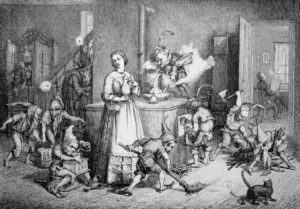Wokeness is spreading across the world so rapidly it’s hard to keep up with all the changes. It seems that every week, someone finds something to label as racist. When peanut butter sandwiches were outed as being discriminatory, we were clued in on just how crazy this movement has become. The newest member of the woke cult is the Canadian Girl Scouts, who have decided its Brownies branch is racist and will soon be rebranding the name.
Brownies are Racist
Girl Scouts is divided into branches according to the ages of the children. The Brownie chapter is for second- and third-graders. And, according to members of the Girl Guides of Canada, parents are skipping this branch of the organization so that their kids aren’t traumatized by being labeled with such a racist name. Jill Zelmanovits, CEO of the organization, said in a press release:
“We heard from several members and former members that the name Brownies has caused them personal harm, so we are changing the name of this branch to further remove barriers for belonging for racialized girls and women. It is clear that this change is the right thing to do – Girl Guides cannot be represented by a term that causes any girl harm.”
The Origin of the Name
 Originally, at this level in the organization, the girls were called Rosebuds, but that name was changed in 1915 because the members didn’t like it and asked for a new one. The founder of Boy Scouts, Lord Robert Baden-Powell, was asked to help find something better and some believe he chose Brownies, after The Brownies, an 1870s story by Juliana Horatia Ewing about a couple of kids who were helpful with household chores.
Originally, at this level in the organization, the girls were called Rosebuds, but that name was changed in 1915 because the members didn’t like it and asked for a new one. The founder of Boy Scouts, Lord Robert Baden-Powell, was asked to help find something better and some believe he chose Brownies, after The Brownies, an 1870s story by Juliana Horatia Ewing about a couple of kids who were helpful with household chores.
Others think Lord Baden-Powell was inspired by tales he heard as a child about small mythical creatures called “brownies.” In Ewing’s fable, a mom is frustrated over her messy cottage and says, “If only we had a brownie!” When her children asked her what a brownie was, she explained how they would do good deeds like wash the dishes while everyone else was asleep. The children set out to find one of these mystical do-gooders and came across the Wise Owl who tells them to look into a pool while reciting a rhyme. Eventually, the children discover that they are supposed to be the brownies and it is up to them to do the good deeds.
However, brownies have been around for a very long time, especially in folklore. They are described as “small, good-natured spirits or goblins (sometimes called ‘magical little people’) that would appear during the night and do good deeds around the house, without ever having to be asked to help.” The only thing about these little legends that could be misconstrued as racist is that “those who caught glimpses of them described them as very small, with brown hair and skin.”
Girl Scout Brownie leaders are called Owls, and some packs use a toadstool symbol, which represents the belief that Brownies used to dance around toadstools. Part of the ritual for joining includes an exercise where the members walk through an imaginary forest with the other girls pretending to be trees. And, just as in the Ewing fable, the young girl looks into a “pool” and says the rhyme. Afterward, depending on how the Owl is running the ceremony, the girls recite the Brownie oath and become full-fledged members.

(Photo by: Bildagentur-online/Universal Images Group via Getty Images)
While Canada and the US do have different versions of the oath the girls take, they are similar:
US: “On my honor, I will try: To serve God and my country, To help people at all times, And to live by the Girl Scout Law.”
Canada: “I promise to do my best, To be true to myself, my beliefs and Canada, I will take action for a better world, And respect the Brownie Law.”
The idea behind Brownies was not racist; it was a way to encourage children to do good deeds using folklore and creating imagination. Now the organization will not only have to rebrand the name, but also the entire premise behind this level of Girl Scouts.
Rob McLean, assistant professor of marketing at the University of Guelph, says what the organization is doing is “brave.” He explained: “They’re not just putting out words, they’re making a real change. The message it sends about inclusivity to all their members is pretty powerful.” He added:
“It’s a difficult decision to make because the brand is over a century old. But at the same time, it’s probably an easy decision to make because it was creating a barrier to membership. And an organization like Girl Guides has to be inclusive.”
McLean agrees there will be some financial burden but suggested they can afford it, “Especially if they consider how much is made in cookie sales alone.”
However, an entire tradition is being scrapped under the guise of being racist when the foundation beneath it is nothing of the sort. Instead of canceling something because some people are under the impression it is discrimination or insulting, more time should be spent educating prospective members on the true meaning and original thoughts behind the concepts. Girl Guides Canada is working with “racialized” past and present members to come up with a new moniker, which they expect to announce in January, with the changes beginning in September 2023.

